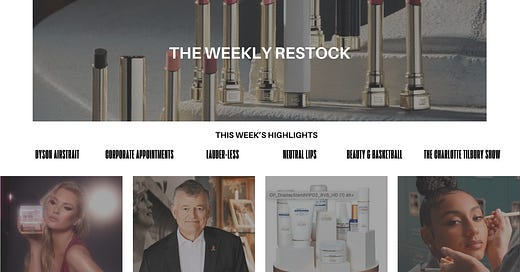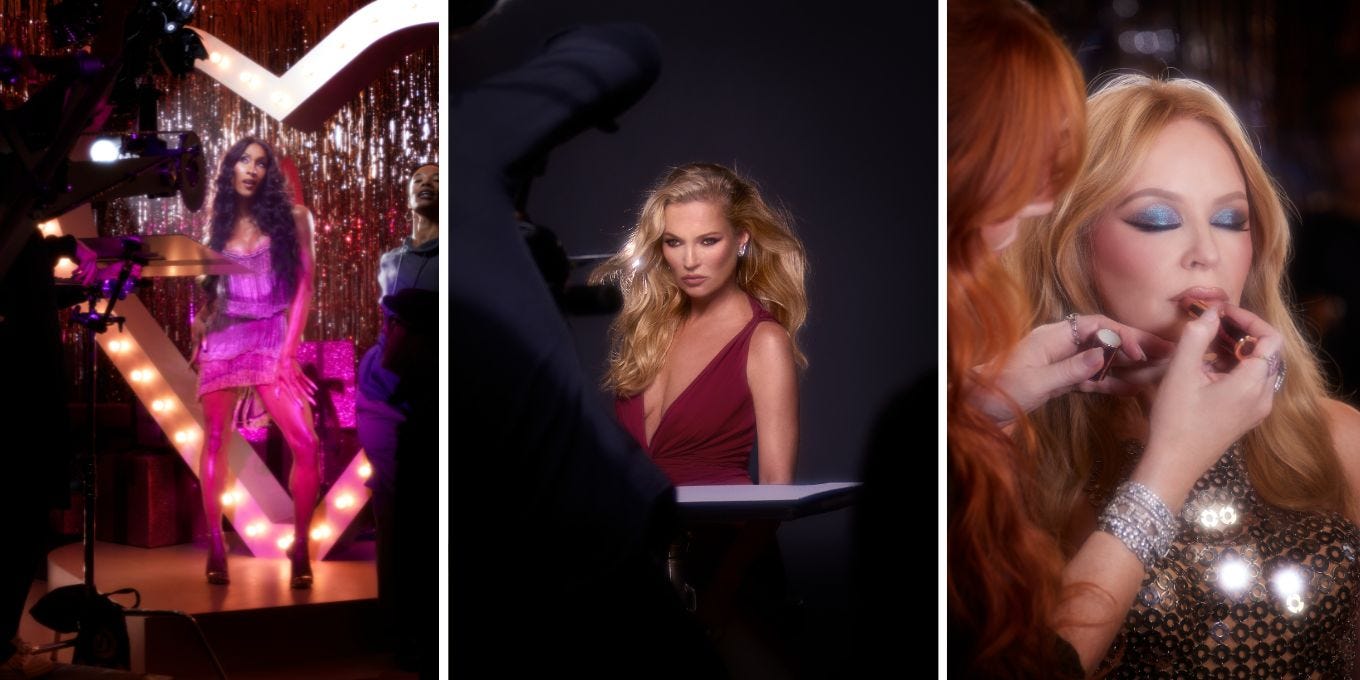Welcome back to the beauty aisle, a weekly newsletter that stocks your inbox with beauty news, product launches, and trends. So many new readers this week—so happy that you’re here!
This week, I’m shaking up the order and sharing my thoughts on Dyson’s recent controversy. In a pinch? Feel free to scroll down to read the latest in beauty news + launches.
Happy shopping scrolling!
📱 Breakroom Banter
the latest chatter
In a now-deleted Instagram Reel titled “Stretch. 👏 Dry. 👏 Glide,” Dyson shared a video of a Black model passing the Airstrait straightener through her 4c hair. There was no visible difference. The video met with such backlash that Dyson decided to take it down, but not before exposing a persistent issue within the beauty industry. For Black beauty consumers, especially those with coily or kinky hair textures, this wasn’t a one-off mistake; it was yet another example of how brands can so easily miss the mark when it comes to genuine inclusion.
For Black consumers, this incident wasn’t just about a poor product demonstration—it was a reminder that many beauty brands seem to treat diversity as a checkbox rather than a true commitment. But are we really surprised? Companies like Google, Meta, and Target either scaled back or abandoned their DEI programs put in place in the wake of the 2020 Black Lives Matter movement. Truthfully, when we see companies fail to understand the specific needs of Black consumers in the beauty space, it highlights a broader problem: the absence of Black voices in boardrooms, behind the cameras, and in decision-making roles.
Hire Black.
Let’s start with Black voices in boardrooms. Only 4-5% of all employees in the U.S. beauty industry are Black, and I’m one of them. Without Black professionals in junior, mid-level, and executive roles, decisions are often made in echo chambers, leading to products and campaigns that feel performative rather than inclusive. That’s one of the many reasons why Black consumers are three times more likely to be dissatisfied than non-Black consumers with the slim options available for hair care, skincare, and makeup. Real change happens when brands invest in diversity across all levels and functions. Without these decision-makers and contributors (because coordinator voices are important too!), there’s no one to challenge problematic ideas, to push for inclusive product testing, or to ensure that diversity doesn’t stop at the surface level.
Who’s On Set??
The call for representation on set has been a topic for years. We’ve all heard the stories—Black models having to do their own hair and makeup, tears from the pain and embarrassment of ill-styled hair, the list goes on and on. We’re still in an age where textured hair education is not required in cosmetology schools in all states. Until that changes, brands must have on-set professionals who are knowledgeable about textured hair and can work with all skin tones. Simple, but still somehow a difficult production issue.
The Era of Rage-bait content.
There’s been a disturbing trend of what I believe are purposeful PR mailings of products that brands know won’t work for the influencer, hoping the controversy will generate engagement. It manipulates Black beauty consumers into engaging out of frustration rather than excitement, reducing their needs and preferences to a means of driving clicks and comments.
The frustration isn’t about one bad ad or one ineffective product demo. It’s about an ongoing cycle of being seen as a consumer base to exploit rather than a community to authentically connect with. YSL is a perfect recent example—they sent influencer Golloria all six shades of their new ‘Make Me Blush’ 12H Blurring Liquid Blush, none of which were suitable for her skin tone. For Black women and other people of color, this kind of performative diversity feels exhausting. It’s not enough to see Black faces in beauty campaigns if the products themselves aren’t designed with our needs in mind.
Addressing racial inequity in the beauty industry is a $2.6 billion opportunity. Black consumers have significant purchasing power in the beauty industry. In 2021, $6.6 billion was spent on beauty. That’s 11.1 percent of the total U.S. beauty market, lagging slightly behind the 12.4 percent Black representation in the total U.S. population. Yet, Black consumers still remain underserved and overlooked—a reality that brands can no longer afford to ignore if they truly seek both equity and growth. Real inclusion requires real change, and until we hire and train stylists and diversify corporate talent*, Black consumers will continue to call out brands missing the mark.
*kept this brief, but change requires much more than this :)
📰 This Past Week in Beauty
10/24-11/6
e.l.f Beauty continues its winning streak with a 23rd consecutive quarter of growth, delivering a 40% sales boost in Q2 ($301.1M!!). Thanks to its affordable “dupes” and expanded reach, e.l.f. is now forecasts $1.32 to 1.34 billion in net sales for fiscal 2025.
Rejoice! There’s a new Chief Executive Officer at Dieux. Ryan Scott, former President and CPO at Tatcha, known for his strategic commercial strategy, culture creation, and marketing, plans to solidify the brand’s position as a leader in both the science and soul of beauty. Co-Founder Charlotte Palermino, who previously held the CEO title, will now be the brand’s first Chief Brand Officer.
111SKIN has appointed Vanessa Goddevrind, who previously led McKinsey’s EMEA Beauty Practice where she led research on beauty and personal care in the EU, as CEO. Eva Alexandridis, who previously held the title, will continue to her involvement in the company as the Chief Creative Officer.
L'Oréal’s Dermatological Beauty division is venturing into scalp care in the U.S. with CeraVe and Vichy’s Dercos. Both lines focus on scalp health as an extension of skincare, offering sensitive-skin-friendly formulas designed with dermatologist input to address dandruff and scalp issues while maintaining hair’s softness and shine.
The brand that brings you the cult-classic exfoliating toner that smells like onion and horseradish will now be carried at Bergdorf Goodman. Biologique Recherche will offer a curated assortment like the iconic Lotion P50 and its exclusive Skin Instant Lab, a skin diagnostic tool designed to take an in-depth snapshot of clients’ skin and monitor changes over time.
Estee Lauder Companies is going through it. They reported net sales of $3.36 billion for Q1 2025, a decrease of 4% from $3.52 billion in the prior year. This dip in performance is highlighted by a 5% drop in sales, driven largely by shifting consumer attitudes in China and challenges in the Asia travel retail market (lower replenishment orders). They also reported a $156 million net loss in its last quarter due to charges associated with talcum powder litigation settlement agreements to the tune of $159M and expenses associated with the Restructuring Program under the company’s Profit Recovery and Growth Plan. With this, ELC withdraw their annual forecast which sent their stock down 17% pre-market trading (10/31).
Lauder-less. William P. Lauder is stepping down as executive chairman. “My decision to focus solely on my role as chair of the board represents an important evolution for the Lauder family,” he said in a statement. “Our family’s long-standing day-to-day management of the company is evolving and reflects my desire to focus more on the overall strategic direction of the company.”
CHA CHING💰 The pay package of ELC’s new CEO and president has been revealed…Stéphane de La Faverie will rake in an annual rate of $1.5 million and his aggregate bonus opportunity at target will be $3 million, which for fiscal 2025 will be prorated based on his time in the role of president and CEO. Let me get on my zoom*…
Caladera + Lab has raised $6M for its Series A funding round from HIPstr. This premium skincare line combines “innovative science, nature’s purest and potent ingredients, and sustainable business practices to create men’s skincare products”.
The former brand architects of K18 and Olaplex acquired Matter of Fact skincare for an undisclosed sum.
Everyone’s favorite TikTok dermatologist, Dr. Muneeb Shah (18.1M followers!!!), and skincare innovator, Dr. Dhaval Bhanusali, are Neutragena’s new Global Innovation Partners.
The National Advertising Division of BBB National Programs found Drunk Elephant’s safety claims for kids and tweens were supported, but urged the brand to ensure influencer posts are 'clear and conspicuous' in disclosing material connections. The FTC hates to see these influencers coming.
Design Essentials, the Black-owned hair care brand based in Atlanta has pledged $1M each to Spelman Collage towards the launch of its Cosmetic Science Program and Howard University for the creation of The Design Essentials Community Fund. We love to see it!
Remember those aquafacials you used to be able to get at Sephora if you spent $xyz back in the day? Sadly, Sephora is ending its partnership with Hydrafacial at the end of the year.
*Phase explained here
🛍️ Just In
launches you can’t miss (or can you?)
💄 Remember CW’s hit show Riverdale? Betty Cooper aka Lili Reinhart has joined the celebrity skincare line wagon and launched ‘Personal Day’ a skincare line for acne-prone skin with five SKUs—Full Clarity Cleansing Powder, Doing the Work Acne Treatment, Lightweight Dive Deep Mevalonic Moisturizer, Even Keel Resurfacing Peel, and Everybody Stay Calm Recovery Mask.
💄 Amorepacific is launching a face-conforming LED mask which has been verified in clinical trials to improve dermis elasticity by 340%.
💄 Dolce & Gabbana Beauty launched ‘The Lip Stylos’ available in 18 shades and three formats—matte, satin & sheer.
💄 Smashbox is venturing in fashion and has collaborated with Mexico City-based accessories brand Ilka. I almost forgot about them.
💄 Keys Soulcare by Alicia Keys has expanded their best selling “Let Me Glow” Illuminating Serum with three new ‘crystal-inspired shades’.
💄 SKKN By Kim launched silk matte lipsticks in a range of neutral shades.
💄 Too Faced launched a lip gloss ring! I repeat, Too Faced launched a lip gloss ring! For $22…
🎬 Aisle Spotlight
Best of campaigns
NYX Professional Makeup has teamed up with USC Women’s Basketball star JuJu Watkins in a pioneering partnership aimed at enhancing the brand's presence in women's sports, marking one of the first endorsement deals for a female college basketball player. Watkins will serve as an ambassador for the brand, starring in campaigns that promote the “Make Them Look” initiative that promotes self-expression and empowerment among female athletes.
Urban Decay has tapped Cameron Brink, the #2 WNBA draft pick and rising star of the Los Angeles Sparks, as its newest brand ambassador. “Partnering with Urban Decay is incredibly important to me because it represents more than just beauty—it's about investing in authenticity"
Charlotte Tilbury has been teasing its holiday campaign “The Charlotte Tilbury Show” set to launch on World Kindness Day (11/13). Inspired by the Royal Variety show, the campaign features an iconic lineup of stars like Kate Moss, Richard E. Grant, Kylie Minogue, and Michaela Jaé Rodriguez, who will showcase their unexpected talents in beauty and entertainment. 100% of proceeds made from Magic Cream sales on 11/13 will go to The King’s Trust, a charity that empowers young people in the UK to gain confidence and build their futures.
Candy Crush gave away free hair makeovers on Halloween to promote the '‘Candy Crush Saga’.
Thanks for scrolling with us today. See you next week!







